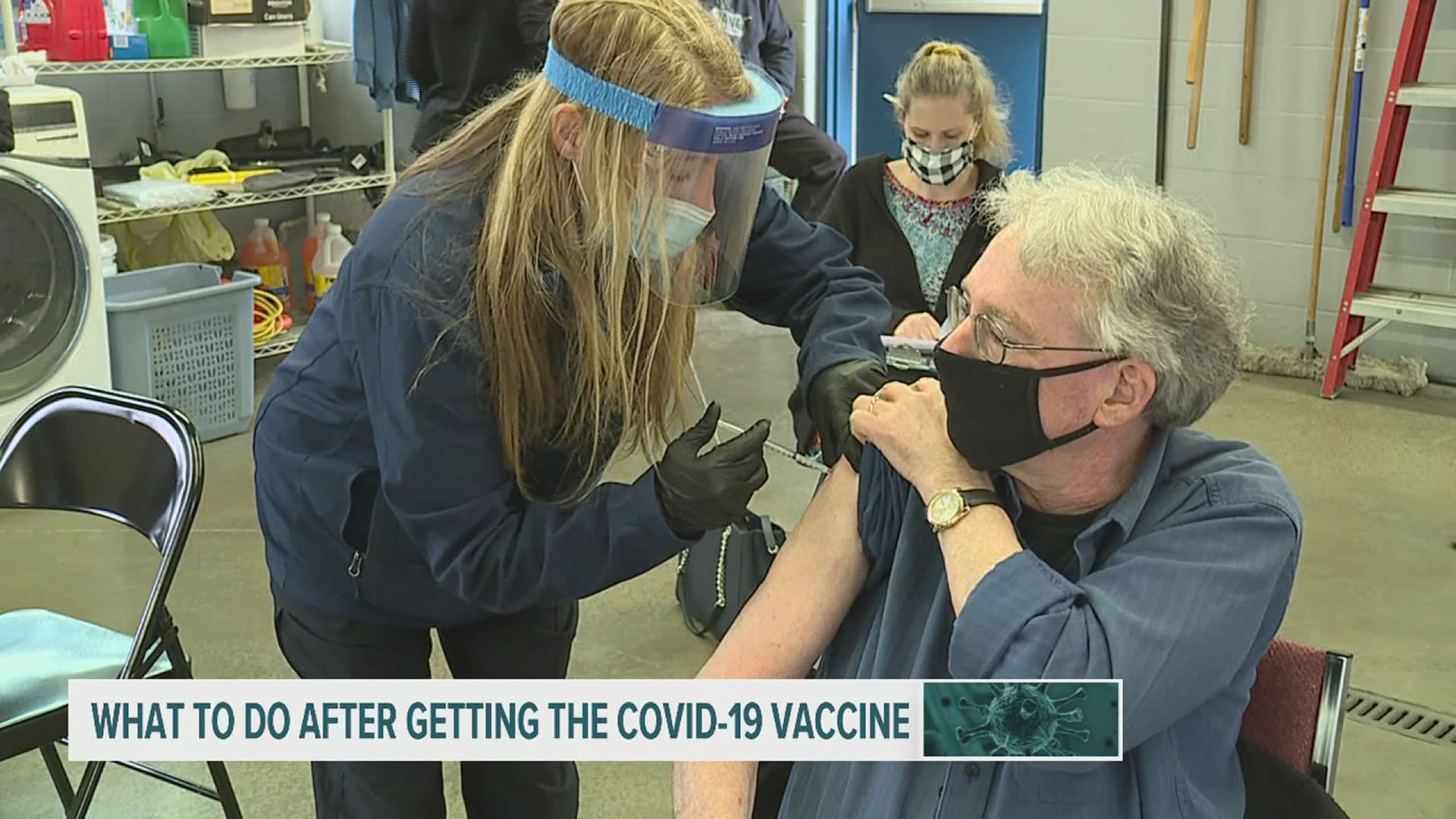LANCASTER COUNTY, Pa. — What can people do before and after getting the COVID-19 vaccine? Can you drink? Should you workout? How about get another vaccine? FOX43 took people's questions to a Lancaster County doctor to get answers.
"It's not going to cause infertility. It's not going to put a microchip in you. It's not the mark of the devil," reassured Dr. Michael Reihart, the medical director for Lancaster EMS.
Dr. Reihart not only debunked some common myths surrounding the vaccine, the physician also addressed how people can plan ahead prior to getting their shots.
"The answer I am going to give without the question is, 'Should you get the vaccine?' Absolutely, yes, you should get the vaccine," said Dr. Reihart. "It's highly effective, and it's going to safe lives."
Dr. Reihart says some people are experiencing symptoms after the first and/or second dose.
"That is actually reassuring, when you get some feeling of illness, because that is your immune system working," he explained.
What can people do if they get a fever, headache, or body aches? Can they take pain reliever?
"Yes, you can use Advil, Tylenol, and drink lots and lots of fluids. Take it easy. Maybe even a little chicken soup," said Dr. Reihart.
The Food and Drug Administration has released a COVID-19 vaccine fact sheet for recipients and caregivers.
What about having an adult beverage before or after getting the vaccine?
"Anytime you add something new to your body, and then alcohol, remember the liver and kidneys detoxifies everything, when you add another thing into the body, it further stresses your body so I'd try to avoid alcohol for the first 48 hours," stated Dr. Reihart.
Because people could experience mild symptoms, particularly after the second dose, it might be best for people to plan ahead.
"I know a lot of people in the medical field plan who actually plan on not feeling well after the vaccine so maybe getting to the store beforehand so you don't have to worry about driving," he suggested.
Some people report soreness in their arm after getting the shot. What can you do if that happens?
"Rubbing the area, moving the area. It helps increase blood supply to the area. You can also put cold compresses on there," said Dr. Reihart.
Dr. Reihart says the arm soreness is only concerning if it persists. Then, it's best to give your doctor a call.
Speaking of moving, can you workout afterwards? Dr. Reihart says absolutely. What about getting other vaccines or taking prescription medicine?
"Most of it is on a case-by-case basis. Vast majority of medications and this vaccine work well together," he said.
If you have concerns, Dr. Reihart says check out the CDC's website or call your primary care doctor.
"Even where you go to get the injections, you can ask them for their advice," responded Dr. Reihart.
Dr. Reihart says the vaccine will not cause COVID-19. People will only get a positive test result if they had the virus prior to getting their shots. He is asking those with apprehension to see the life-saving benefits.
"Getting a little bit of local irritation, getting a needle stick, maybe feeling virus symptoms for 24 to 48 hours to prevent a potentially lethal viral infection, it's a no brainer to me," said Dr. Reihart.
What lasts longer? Immunity after getting COVID-19 or immunity from a COVID-19 vaccine? According to the CDC, the protection someone gains from having an infection (called “natural immunity”) varies depending on the disease, and it varies from person to person.
The CDC states because COVID-19 is new, health officials are not sure how long natural immunity might last. Current evidence suggests that getting the virus again (reinfection) is uncommon in the 90 days after the first infection with the virus that causes COVID-19.
The CDC states health officials won’t know how long immunity lasts after vaccination until they have more data on how well COVID-19 vaccines work in real-world conditions.
The CDC says it takes time for people to build protection after any vaccination. Officials say COVID-19 vaccines that require 2 shots may not protect you until a week or two after your second shot.
Can people return to life as normal after getting vaccinated? While the CDC reports strong efficacy rates (95% and 94.5%, respectively, for the Pfizer and Moderna vaccines) in preventing illness, getting vaccinated does not mean people can ditch masks and social distancing immediately.
Studies of these vaccines only measured if people develop symptoms, not if they can still spread the virus. People can still be asymptomatic carriers and transmit the virus to others without knowing it.
According to the CDC, there have been 41,411,550 total doses distributed and 21,848,655 total doses administered.

